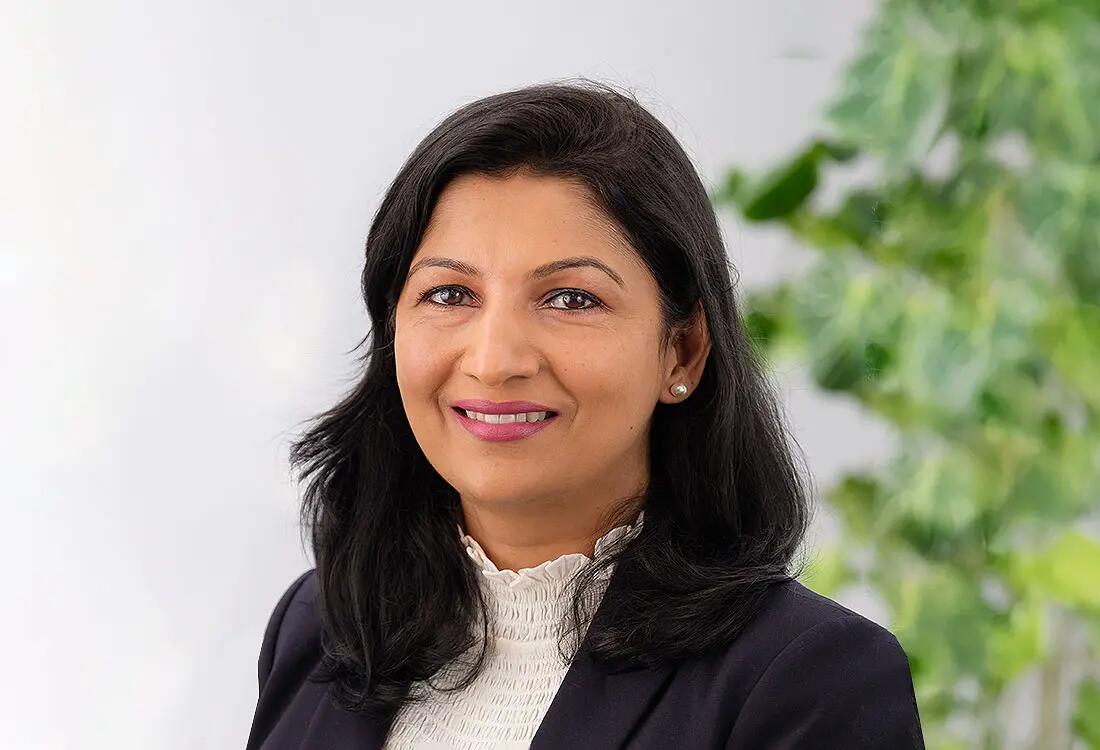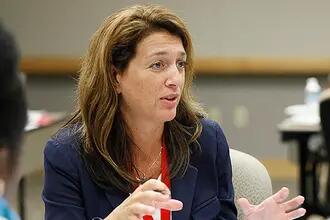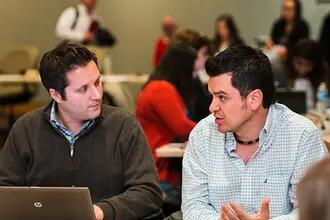
Program Completed:
- Mini-MBA: Data-Driven Management
- Risk Management Certificate Program

Alumni Spotlight: Pooja Maini
Pooja Maini is a Digital Transformation Leader at Siemens Financial Services for Project and Structured Finance Americas with a passion for business transformation and strategic leadership. In collaboration with key business stakeholders, she is known for her ability to identify opportunities for growth and develop actionable plans to achieve business objectives. She currently leads the digital transformation of internal processes through automation and digitalization. Pooja serves as the bridge between business and IT teams, facilitating the introduction of new IT processes and leading teams to build use cases on Siemens’ new data platform. Her work focuses on internal processes and risk management, with the goal to accelerate credit decision-making and improving data quality.
Lifelong learning at Siemens is focused on developing, empowering and increasing both employability and resilience among its employees. Pooja was part of a cohort of more than 25 Siemens Financial Services’ employees who participated in the Siemens-sponsored Data Driven Management Mini-MBA program. Within this cohort, teams completed capstone projects that leveraged data to optimize current projects or pursue new opportunities with Siemens Financial Services.
How has your learning been applicable in your current role?
The program transformed my approach to data analysis, enabling me to leverage data-driven insights for strategic decision-making. I am now applying the RICE prioritization framework as taught during this course. RICE stands for Reach, Impact, Confidence, and Effort, and is used to focus on high-impact initiatives by evaluating how many people will be affected, the potential effect, certainty of success, and the resources required. After taking the course, I challenged my team to look at our projects and ask, “What could we do with this knowledge for Siemens if we had all the relevant data?” With that in mind, we decided to focus on reducing the loan processing turnaround time to increase efficiency. We used the RICE method to prioritize use cases with our focus on analyzing the data to see how long each stage takes and which stages we could influence. By using some of the statistical analysis from the Rutgers course, we were able to determine where we could save time and which stages we could influence.
What motivated you to pursue these programs?
I started the Risk Management Certificate Course with no background in risk management. Before my current role at Siemens, I was a full-stack IT developer. In my current role, I now report to the Chief Risk Officer and am responsible for digitalizing risk processes. For me, this means I need to have a deep understanding of risk, which was one of the reasons I took this job and pursued the course. Completing the certificate course was enough for someone like me, with no risk management background, to understand supply chain, environmental, and financial risks.
For the Mini-MBA: Data-Driven Management program, although I had a deep knowledge of data due to my background as a developer, I was looking to enhance my understanding of data science in particular. This program specifically provided business leaders with the knowledge, tools, and various techniques to use data best to build new business models. At Siemens Financial Services, we have a lot of quality data that we can drive insights from. This course was valuable in that it emphasized data-driven decision making, purposeful analysis, and effective communication of key insights to business leaders and stakeholders.
What was your biggest personal or professional gain from taking these programs?
I’m able to relate to data better, and I use more data in my own personal decision-making. My analytical and decision-making skills are much better as well. I have been able to bring much more confidence to the data-driven projects that I am responsible for implementing. Learning examples of how different major corporations are using data and how we at Siemens can also learn from those examples and apply them to our company has been my biggest return on investment.
What does the term “reinvent” mean to you?
For me, reinventing means changing and transforming ourselves to meet new circumstances and outcomes. It's about always being curious to learn more and going into any situation with an open mind. It’s constantly reinventing who you are, because the world around us is changing so dynamically, especially now with the advent of AI. You can see how fast technology is driving changes, and how it’s becoming more integrated and easier to use as we go.
So, to me, to reinvent is to constantly adapt, be curious, and stay open-minded. “Stay hungry, Stay foolish,” as Steve Jobs once said. I now tackle data-related tasks with a deeper, more strategic mindset.
What does the term “lifelong learning” mean to you?
I see lifelong learning as basically the same thing as constantly learning new things, embracing new challenges, and then evolving from your experiences. For example, one of my resolutions this year was to do microlearning – motivating myself to spend a few minutes each day to learn something new. I love developing both myself and other people, so I'm very focused on that. That's why I love participating in programs like the ones that Rutgers offers. It’s a self-learning, community learning, and instructor-led learning all in one. You really get all of these three components coming together—that's lifelong learning for me.
In looking back on your program experiences, what stands out to you?
One of the key things that stood out to me was how the hands-on exercises that we all practiced together were applicable to our work and not just theoretical learning. In addition to that, having mixed teams from Siemens allowed us to learn from everyone’s diverse experiences in class—both online and offline. That stayed with me and was one of my highlights. As much as the destination was important, the journey itself was meaningful. During the course, I wasn’t sure how much I was learning, but once I completed my Capstone project, it really brought everything together for me. Our professor came for the final presentation, and it was so emotional to present and receive the award at the end of the course. Everybody felt like their months of hard work had paid off, and our professor was pleasantly surprised at the outcome. That was a very surreal feeling that’s hard to describe in words. In the end, we were all proud and appreciated the lasting networks we built through the program.
How do you think your learning has benefited or could benefit your broader organization as a whole?
The combination of Risk Management and Data-Driven Management training has positively impacted Siemens Financial Services and has potential for the broader Siemens as an organization. The knowledge I've gained from these programs has been a real asset for me to enable me to use tools I learnt in daily decisioning. It empowered me to make well-informed decisions, understand risk management processes, and streamline our processes. Seeing the tangible benefits of my learning in my daily work has been incredibly rewarding.
What advice would you give to fellow professionals or colleagues that might not have considered this type of program?
Signing up for these programs was a leap outside my comfort zone due to time commitment, but collaborating on a real Siemens challenge with my team made it truly rewarding. The hybrid nature of the course made it possible for me to join it anywhere during my business trips. The skills I picked up didn’t just boost my confidence, they changed how I approach problems every day. My team and cohort were pleasantly surprised with what one can achieve and the connections one makes along the way.


